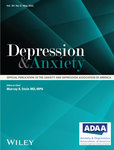The effects of varenicline, bupropion, nicotine patch, and placebo on smoking cessation among smokers with major depression: A randomized clinical trial
Abstract
Importance
Improving treatment outcomes for smokers with major depressive disorder (MDD) can have significant public health implications.
Objective
To evaluate the safety and efficacy of smoking cessation pharmacotherapy among smokers with MDD.
Design
Secondary analysis of a randomized, double-blind, active- (nicotine patch) and placebo-controlled trial of 12 weeks of either varenicline or bupropion with a 12–week follow-up.
Participants
Community volunteers 18−75 years of age; smoke 10+ cigarettes/day; with clinically stable MDD (N = 2635) or no psychiatric disorder (N = 4028), from 140 sites in 16 countries.
Intervention
Twelve weeks of pharmacotherapy (placebo [PLA], nicotine replacement therapy [NRT], bupropion [BUP], varenicline [VAR]) plus brief cessation counseling.
Measure(s)
Primary safety outcome: the occurrence of ≥1 treatment-emergent, moderate to severe neuropsychiatric adverse event (NPSAE). Primary efficacy outcome: biochemically confirmed continuous abstinence (CA) during the final 4 weeks of treatment (Weeks 9–12).
Results
A total of 6653 participants (56% female; 39% MDD) ~47 years old. Risk of NPSAEs did not differ by medication for MDD. MDD had higher risk (p < .0001) for NPSAEs than the NPC. Efficacy (6653; intent-to-treat): CA rates for MDD versus NPC respectively were 31.2% versus 38.0% VAR; 23.0% versus 26.1% BUP; 22.6% versus 26.4% NRT; and 13.4% versus 13.7% PLA but no differential treatment effect was noted within the cohorts. All active treatments differed from PLA but VAR showed the largest effect.
Conclusions
Results suggest that for MDD smokers, inclusive of those with recurrent episode, varenicline plus counseling may be the best pharmacological option for the treatment of smoking given its greater efficacy effect size and similar risk of NPSAEs.
Trial registration
ClinicalTrials.gov Identifier: NCT01456936. https://clinicaltrials.gov/ct2/show/NCT01456936.
Open Research
DATA AVAILABILITY STATEMENT
Upon request, and subject to review, Pfizer will provide the data that support the findings of this study. Subject to certain criteria, conditions and exceptions, Pfizer may also provide access to the related individual de-identified participant data. See https://www.pfizer.com/science/clinical-trials/trial-data-and-results for more information.




